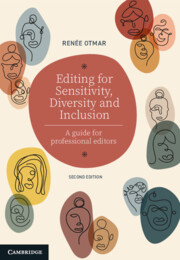Book contents
- Editing for Sensitivity, Diversity and Inclusion
- Acknowledgement of Country
- Editing for Sensitivity, Diversity and Inclusion
- Copyright page
- Dedication
- Contents
- About the author
- Preface
- Acknowledgements
- Part One Foundations
- Part Two Professional practice
- Chapter 5 Identifying the explanatory framework within a text
- Chapter 6 Literary worth versus literary intention
- Chapter 7 Plagiarism
- Chapter 8 Literary appropriation
- Chapter 9 Cultural appropriation
- Chapter 10 Decolonisation
- Chapter 11 Legal reading
- Chapter 12 The main types of critical appraisal
- Chapter 13 Editing for sensitivity, diversity and inclusion
- Chapter 14 Moral and ethical dimensions of editing
- Chapter 15 Developing a workplace policy and style guide
- Chapter 16 Principles for a professional practice
- Chapter 17 Care of the self
- Conclusion
- Part Three Guide
- Index
Chapter 7 - Plagiarism
from Part Two - Professional practice
Published online by Cambridge University Press: 24 August 2023
- Editing for Sensitivity, Diversity and Inclusion
- Acknowledgement of Country
- Editing for Sensitivity, Diversity and Inclusion
- Copyright page
- Dedication
- Contents
- About the author
- Preface
- Acknowledgements
- Part One Foundations
- Part Two Professional practice
- Chapter 5 Identifying the explanatory framework within a text
- Chapter 6 Literary worth versus literary intention
- Chapter 7 Plagiarism
- Chapter 8 Literary appropriation
- Chapter 9 Cultural appropriation
- Chapter 10 Decolonisation
- Chapter 11 Legal reading
- Chapter 12 The main types of critical appraisal
- Chapter 13 Editing for sensitivity, diversity and inclusion
- Chapter 14 Moral and ethical dimensions of editing
- Chapter 15 Developing a workplace policy and style guide
- Chapter 16 Principles for a professional practice
- Chapter 17 Care of the self
- Conclusion
- Part Three Guide
- Index
Summary
The mere mention of the term “plagiarism” can strike fear into the heart of an academic editor; likewise “attribution” and “citation”. Editors of fiction and poetry can take no great comfort, either: our Nemesis might be found in the subgenre fan fiction and the saying that “imitation is the sincerest form of flattery”.
So, what exactly is literary appropriation, and what is its relationship to plagiarism?
Keywords
- Type
- Chapter
- Information
- Editing for Sensitivity, Diversity and InclusionA Guide for Professional Editors, pp. 61 - 65Publisher: Cambridge University PressPrint publication year: 2023
- 1
- Cited by

